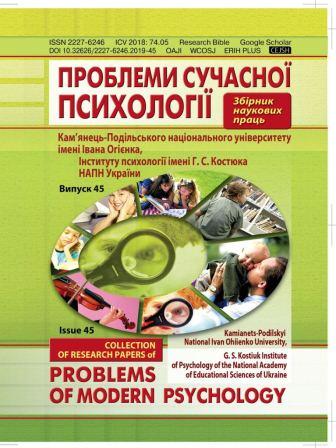Cultural and Value Characteristics as Determinants of Personality Development in Student Environment
DOI:
https://doi.org/10.32626/2227-6246.2019-45.338-357Keywords:
cultural and value orientations, ethnic stereotypes, interethnic relations, ethnic identity.Abstract
The directions of the study on cultural and value orientations of youth in mo
dern psychology are analyzed in the article. It is stated by the authors that
the relevance of the study of cultural and value orientations of students in the
conditions of globalization is determined, on the one hand, by their inclusion
in the multicultural educational environment, the development of academic
mobility, and on the other hand, agerelated unpreparedness, value imma-
turity strategies of the individual, which form the basis of adaptive potential
of the individual, e0exFB00ctive interaction at the student age. The formation and
development of cultural and value orientations in the plane of interethnic
interaction is considered by the authors. Interrelations of cultural and value
orientations with social processes and interethnic interaction are revealed.
The in0xFB02uence of interethnic interaction on the formation of cultural and value
orientations of student youth is established. The analysis of the process of
formation of cultural and value orientations is carried out; it is related to the
ethnic aspects of communication, which are identical with di0exFB00rent types of
social relations in society. The results of empirical research of cultural and va
lue orientations of students are presented. The groups of interacting features
and the most signi0xFB01cant variables are distinguished with the help of factor
analysis. It is stated that interethnic and intercultural communications in the
educational environment can act as an e0exFB00ctive condition for the develop-
ment of cultural and value orientations of student youth.
It is suggested to improve the positive indicators of orientation of student
youth to other peoples to use di0exFB00rent types of group and training programs
that could contribute to the development and formation of positive ethnic
orientations in relation to di0exFB00rent ethnic groups with which there is real or
potential interethnic interaction.
References
Banakh, V. A., & Banakh, L. S. (2016). Transformatsiia tsinnisnykh oriientatsii molodi v umovakh kryzovoho suspilstva [Transformation of value orientations of youth in conditions of crisis society]. Humanitarnyi visnyk ZDIA – Humanitarian Newsletter of ZSEA, 64, 13–21 [in Ukrainian].
Dolynska, L. V., & Stakhova, O. O. (2016). Tsinnisni oriientatsii yak psykholohichnyi mekhanizm rozvytku profesiinoi samosvidomosti maibutnoho vchytelia pochatkovykh klasiv [Valuable orientations as a psychological mechanism for the development of professional self-awareness of the future teacher of elementary school]. Naukovyi chasopys Natsionalnoho pedahohichnoho universytetu imeni M. P. Drahomanova – Scientific journal of M. P. Drahomanov National Pedagogical University. Series 12. Psychological sciences, 3, 224–231 [in Ukrainian].
Yevtukh, V. (2012). Etnichnist [Ethnicity]. Kyiv : Feniks [in Ukrainian].
Leont’ev, D. A. (1992). Metodika izuchenija tsennostnyh orientatsij [Methodology of studying value orientations]. Moskva : Smysl [in Russian].
Matiazh, S. V., & Bereznianska, A. O. (2013). Klasyfikatsiia tsinnostei ta tsinnisnykh oriientatsii osobystosti [Classification of values and value orientations of personality]. Naukovi pratsi – Scientific works, 213, 27–30 [in Ukrainian].
Onufriieva, L. А. (2017). Psychological characteristics of personality development and the formation of professional self-consciousness of the student’s personality while studying at higher educational institution. S. D. Maksymenko, L. A. Onufriieva (Eds.). Problemy suchasnoi psykholohii – Problems of modern psychology: Collection of research papers of Kamianets-Podilskyi National Ivan Ohiienko University, G. S. Kostiuk Institute of psychology of NAES of Ukraine, 35, 336–346. Kamianets-Podilskyi : Aksioma.
Onufriieva, L. А., & Rudzevych, I. L. (2018). The professional realization of personality through the prism of value life regulators. S. D. Maksymenko, L. A. Onufriieva (Eds.). Problemy suchasnoi psykholohii – Problems of modern psychology: Collection of research papers of Kamianets-Podilskyi National Ivan Ohiienko University, G. S. Kostiuk Institute of psychology of NAES of Ukraine, 40, 273–284. Kamianets-Podilskyi : Aksioma. DOI 10.32626/2227-6246.2018-40.273-284.
Soldatova, G. U. (1998). Psihologija mezhjetnicheskoj naprjazhennosty [Psychology of interethnic tension]. Moskva : Smysl [in Russian].
Jadov, V. A. (1994). Sotsial’naja identifikatsija v krizisnom obshchestve [Social identification in a crisis society]. Sotsiologicheskij zhurnal – Sociological Journal, 1, 35–52 [in Russian].
Hofstede, Geert (1990). Cultures and Organizations: Software of the Mind. London : McGraw-Hill.
Hofstede, Geert (1984). Culture’s Consequences. Beverly Hills, CA : Sage.
Inglehart, R. (1990). Cultural change in advanced industrial societies. Princeton, NJ : Princeton University Press.
Markus, Hazel, & Shinobu, Kitiyama (1991). Culture and the Self: Implications for Cognition, Emotion, and Motivation. Psychological Review, 98, 224–253.
Martin, Judith N., & Nakayama, Thomas K. (2010). Intercultural Communication in Contexts, 5th edition. Boston : McGraw Hill.
Schwartz, Shalom H. (1999). Theory of Cultural Values and Some Implications for Work. Applied Psychology: An International Review, 48, 23–47.
Downloads
Published
How to Cite
Issue
Section
License
Copyright
The Editorial Board has the full right to publish original scientific papers containing results of theoretical and experimental research works which are not currently subject to review for publication in other scientific editions. The Author shall transfer to the editorial board of the Collection the right to spread the electronic version of the paper, as well as the electronic version of the paper translated into English (for papers originally submitted in Ukrainian and Russian) by all kinds of electronic means (placement at the official website of the Collection, electronic databases, repositories etc).
The Author of an article reserves the right to use materials of the paper, without approval with the editorial board and the founders of this Collection: a) partially or fully, for educational purposes; b) for writing own dissertation papers; c) for preparation of abstracts, conference reports and presentations.
The Author of an article can place electronic copies of the paper (including the final electronic version downloaded from the official website of the Collection) at:
- personal web resources of all Authors (websites, webpages, blogs etc.);
- web resources of the institutions where the Authors are employed (including electronic institutional repositories);
- non-profit public access web resources (for example, arXiv.org).
But in all cases, it is obligatory to have a bibliographic reference to the paper, or a hyperlink to its electronic copy placed at the official website of this Collection.






